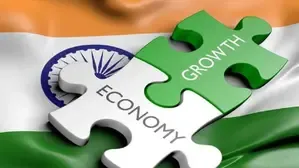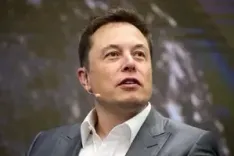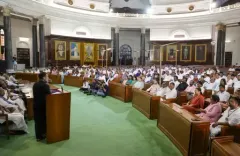Indian Economy Anticipated to Achieve 6.8% Growth in 2025-26: Bank of Baroda Analysis

New Delhi, Jan 9 (NationPress) The Indian economy is anticipated to achieve a significant growth of 6.8 per cent in the fiscal year 2025-26, propelled by strong high-frequency indicators, as per a forecast from Bank of Baroda.
The analysis predicts that nominal GDP growth will hover around 10.5 per cent in the upcoming fiscal year. It underscores that key elements contributing to this growth include robust air passenger traffic, an uptick in services PMI, and a rise in GST collections. Furthermore, increased sowing of rabi crops is expected to enhance agricultural productivity, providing a solid base for the economy.
The report emphasizes the resilience of the Indian economy, bolstered by strong festive demand and a steady uptick in economic activities. This resilience is mirrored in high-frequency indicators that have shown considerable improvement in the third quarter of FY25.
The analysis states that despite a slowdown in 2024-25, there is positive news as both private and government consumption are projected to grow at 7.3 per cent (compared to 4 per cent in FY24) and 4.1 per cent (up from 2.5 per cent in FY24), respectively, in FY25. In a surprising development, export growth is also expected to be strong at 5.9 per cent, contrasting with a 2.6 per cent growth in FY24.
The report further notes that government spending is anticipated to gain momentum in the latter half of 2024-25, serving as a significant growth driver. Additionally, the outlook for the agricultural sector remains positive.
Nevertheless, the document warns of potential risks stemming from global challenges. A looming concern is the possibility of a tariff conflict as the incoming US administration under President Trump may adopts protectionist trade policies. Such actions could disrupt global trade and lead to retaliatory measures, posing threats to global economic stability.
It states, "A range of economic and strategic risks prevail following the implementation of tariff policies by the incoming US President Mr Trump. This could have far-reaching consequences on global trade".
On the domestic front, attention will shift towards significant economic events, including the Union Budget, corporate performance in the latter quarters, and monetary policy decisions from the Reserve Bank of India, as highlighted in the report.









